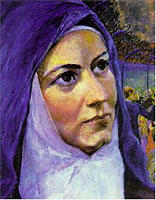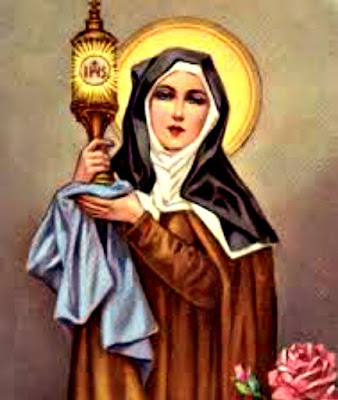
St. Teresa Benedicta of the Cross, Virgin and Martyr
[Edith Stein] (1891-1942)
Born on October 12, 1891, of Jewish parents, Siegried Stein and Auguste Courant, in Breslau, Germany, Edith Stein showed a strong aptitude for learning, and by the time of the outbreak of World War I, she had studied philology and philosophy at the universities of Breslau and Goettingen.
Following the war, she continued her higher studies at the University of Freiburg and was awarded her doctorate in philosophy Suma Cum Laude at age 25. She later became the assistant and colleague of Professor Husserl, the famous founder of phenomenology, who greatly appreciated her brilliant mind.
Edith was searching for the truth and found it in the Catholic Church, initially through her study of the autobiogrphy of St. Teresa of Avila and the works of St. Thomas Aquinas. She was baptized in the Church on New Years' Day, 1922.
Following her conversion, Edith became a famous author and philosopher, and spent her days writing, translating, teaching, and lecturing.
She entered the Discalced Carmelie Nuns’ cloistered community at Cologne-Lindenthal on October 14, 1933 and made her profession of vows at the age of 43, taking the name Sister Teresa Benedicta of the Cross.
On August 2, 1942, Edith was taken from her monastery and transported by cattle train to the death camp of Auschwitz. The conditions in the box cars were so inhuman that many died or went insane on the four day trip. She died in the gas chambers at Auschwitz at the age of 51 on August 9, 1942.
Quotes
“One cannot desire freedom from the cross when one is especially chosen for the cross.”
“God Himself teaches us to go forward with our hand in His by means of the Church’s liturgy.”
“The more lofty the degree of loving union to which God destines the soul, so much more profound and persistent must be its purification.”
“There is a state of resting in God, an absolute break from all intellectual activity, when one forms no plans, makes no decisions and for the first time really ceases to act, when one simply hands over the future to God’s will and ‘surrenders himself to fate’.”




Comments
Post a Comment
Comments are moderated and are published at the blogger's discretion.